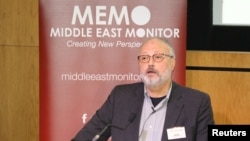A week before his death, Saudi journalist Jamal Khashoggi noted at a conference he attended, "Change will happen solely because of the grave mistakes committed by the [Arab] despots."
His remark strikes his friends as appallingly ironic, and they're determined to ensure his death by alleged assassins, with links to Saudi Arabia's Crown Prince, in what Turkish President Recep Tayyip Erdogan says was a meticulously planned premeditated murder, won't have been for nothing.
They hope Khashoggi's slaying ends up as a "mistake" marking the beginning of the end for Saudi Arabia's Crown Prince Mohammed bin Salman. "The biggest threat to the crown prince is what he did," says Khalil Jahshan, a friend of the slain journalist and director of the Arab Center, research group in Washington, D.C.
"Whether he supported it, endorsed it, whether he picked up the phone, as the Turks have alleged, when Jamal entered the consulate and [when they] spoke with Jamal to try to persuade him to head back to Saudi Arabia and he refused, if that is the case it is pretty damning. It is his actual actions that will condemn him," said Jahshan.
Khashoggi's death three weeks ago in Saudi Arabia's consulate in Istanbul, which Riyadh belatedly acknowledged as a tragic error, but insists was a rogue intelligence operation, is emboldening exiled Saudi dissidents and it may trigger a serious challenge from within the kingdom's royal family to the day-to-day rule of the crown prince, say Saudi activists and analysts.
In midst of a crackdown
Khashoggi's death has compounded the widespread fear in the Gulf kingdom of criticizing the royal family and especially of the crown prince, widely referred to as MBS. Activists say people were already cowed by a vicious crackdown on dissent and are afraid now to say anything against the regime, and the murder has terrified the Saudi Diaspora.
But high-profile dissidents living outside Saudi Arabia appear emboldened and are adamant they will make sure the death of the onetime palace insider-turned-critic isn't forgotten or glossed over.
Much of their effort is on ensuring those in the West, who they accuse of overlooking injustice and repression in the kingdom, don't try to assist what they see as a Saudi effort to exonerate the crown prince, who they firmly believe ordered the killing.
"Solace will only come if this turns out to be a tipping point in how the world deals with tyrants and dictators," according to Wadah Khanfar, a Khashoggi friend and president of Al Sharq Forum, an independent network dedicated to finding strategies for political development and social justice in the Middle East.
They draw some comfort from an unlikely figure, Erdogan, who according to his aides sees the killing as a personal insult. The Turkish president is the target of criticism from rights campaigners for overseeing a crackdown on dissent in his own country and for jailing journalists, but he appears ready to continue to press the Saudi government for a full accounting of the killing.
Lack of details
Speaking Tuesday to members of the ruling party, Erdogan said all the culprits should be held accountable to the law, including those who instructed the killers. And he wants them tried in Turkey. His speech carried the strong implication the crown prince isn't innocent. In a remark clearly pointed by omitting any mention of MBS, he said, "I do not doubt the sincerity of King Salman. That being said, independent investigation needs to be carried out. This is a political killing."
Erdogan's speech was a disappointment to many, on Sunday he had said his speech would reveal all the facts about the killing. But he made no mention of audio and video evidence Turkish officials say they have and which have been reportedly shared with Western intelligence agencies.
But Western diplomats say they assume Erdogan knows more than he revealed Tuesday and by withholding what he knows, he's increasing his leverage on Riyadh and turning the screws on the Saudi royal family. That may force the Saudis offer more admissions about the slaying, they say.
Dysfunctional family
As pressure mounts for Riyadh to clear up crucial questions about the killing, there is mounting disapproval of the crown prince in the Saudi royal family from senior princes, many of whom have been sidelined by MBS and bear him a grudge.
His decision to break with Saudi tradition and to rule as a one-man show and not seek consensus for decisions within the royal family could come back to haunt him, say analysts.
Last week, Saudi Prince Khalid bin Farhan Al-Saud, one of the sidelined senior princes, who lives in self-imposed exile in Germany, called publicly for King Salman bin Abdulaziz to abdicate the throne in favor of his brother Prince Ahmed bin Abdulaziz.
Ahmed is the 31st son of the founding king of Saudi Arabia and until Salman decided to make his son MBS the crown prince, Ahmed was next in line to succeed.
For MBS to be stripped of his crown prince status, a so-called allegiance council would have to be convened, but that can only happen with King Salman's agreement.
How the West reacts and what punishment for the killing they decide to impose on Saudi Arabia will be a major factor in shaping the king's thinking, say Saudi activists.
Some analysts discount the idea that King Salman will 'dethrone' his favorite son — doing so would indicate weakness and invite further demands from princes who have been sidelined. And Tuesday there were few signs the crown prince's power was waning — he received a warm welcome at the opening of a high-profile investment summit. However, he did not deliver the opening speech, as had been expected by attendees.








